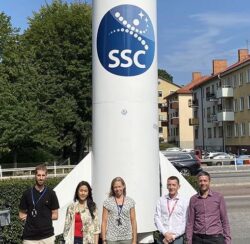press release

The Swedish Space Corporation (SSC) has ordered a ground station from Cailabs as part of the NODES (Network of Optical stations for Data Transfer to Earth from Space) optical communication project supported by the European Space Agency (ESA).
The Scientific Expert Committee of the Swedish company SSC has selected Cailabs to supply a first ground station, strengthening the ground segment for the optical communication market of the future.

Cailabs is now positioned as one of the first private companies in Europe to own and operate a ground station. Within the framework of the Keraunos project(1), Cailabs designed and built a pilot ground station, which was installed this summer at the company’s new headquarters in Rennes.
Thanks to its know-how and investment in optical communications, Cailabs is now able to offer industrial optical ground stations that meet market standards.
These ground stations enable reliable and high throughput communication, thanks to the unique atmospheric turbulence compensation component (TILBA-ATMO by Cailabs), which is integrated and easily embedded, unlike other technologies.
“We are proud to be part of the advancements within this fast-moving industry segment. While the market for optical communication is still young, the need for moving to this unlicensed part of the spectrum if greater than ever. In the coming years our ambition is to offer industry-leading ground station capabilities within optical communication. This first station establishment together with Cailabs is a major step towards this realization,” says Hanna Sundberg, SSC Lead System Architect Optical Communications and Project Manager for the NODES project.
“We are pleased that a private company and major space player like SSC is positioning itself with an agile company like Cailabs, which will deliver a ground station within a short timeframe of one year,” says Fabien Ghez, Sales Director at Cailabs. “This positions Cailabs as a leading supplier of complete optical ground stations in a growing market,” he concludes.
(1) The Keraunos project aims at implementing and operating a complete optical link: from the satellite terminal, embedded in a nano-satellite designed and launched in low orbit by the company Unseenlabs, to the ground.
about CAILabs
Created in June 2013, spin-off of the Kastler Brossel Laboratory, CAILabs has developed an innovative technology for processing light beams. Since 2014, it has been marketing innovative products that increase the throughput of optical fibres. In 2015, the Japanese operator KDDI set the world record for optical fibre throughput using CAILabs components, and in 2016 the AROONA solution for LAN optical fibres won numerous innovation awards, including the Huawei Digital-In-Pulse prize. The solutions designed and developed by CAILabs have the potential to reach many other industrial sectors such as aeronautics or additive manufacturing with dedicated applications.





